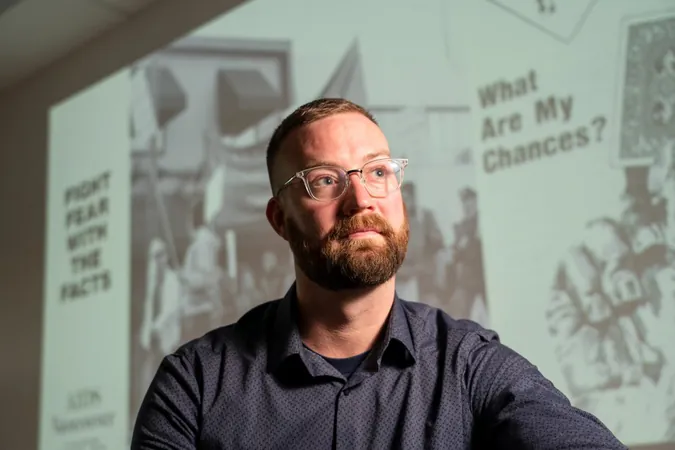
Groundbreaking Research at the University of Victoria: Combatting HIV/AIDS Four Decades Later
2024-11-29
Author: Benjamin
Groundbreaking Research at the University of Victoria: Combatting HIV/AIDS Four Decades Later
It has been over 40 years since the onset of the HIV/AIDS pandemic, a crisis that has tragically claimed around 42.3 million lives globally. Despite significant progress, including major advancements in treatment that have transformed HIV from a death sentence into a manageable illness, the virus continues to present significant public health challenges. In Canada, approximately 62,790 individuals are currently living with HIV.
At the University of Victoria (UVic), health researchers are at the forefront of tackling these challenges, developing effective, equitable, and responsive HIV services while raising awareness about the ongoing impact of the HIV/AIDS pandemic. As we approach World AIDS Day on December 1st, let's dive into the inspiring work of four dedicated researchers from the Faculty of Human and Social Development.
Nathan Lachowsky: Expanding the Voices of HIV Survivors
Nathan Lachowsky, a professor in the School of Public Health and Social Policy, is leading a community-based oral history project known as "HIV in My Day." With a generous $200,000 SSHRC Partnership Development Grant, Lachowsky aims to expand this initiative from its roots in Vancouver to regions across Canada.
This project transforms interviews with HIV survivors and caregivers into theatrical performances, with the inaugural play "In My Day" having premiered at The Cultch theatre in Vancouver in 2022. By making nearly 120 interviews publicly available, the project fosters dialogue and awareness about the lived experiences of those affected by the HIV/AIDS pandemic, bridging generational gaps.
Lachowsky emphasizes the importance of sharing these stories: “It is an honour to lift up the incredible stories of people living with HIV, and we must ensure that new generations learn the history of HIV in Canada.”
Ingrid Handlovsky: Understanding Allyship in the Fight Against Discrimination
Ingrid Handlovsky, an assistant professor in UVic’s School of Nursing, is addressing the rising discrimination faced by Two-Spirit, LGBTQ+, and gender-diverse individuals in Canada. Her research focuses on the collaborative efforts of gay men and allies during the early years of the HIV/AIDS pandemic. By interviewing 2S/LGBTQ+ community members and allies, Handlovsky aims to shed light on effective strategies for resisting discrimination and advocating for human rights.
“The stories of resilience and allyship from the early days of the HIV crisis are critical lessons for today,” shares Handlovsky. “We need to understand the impactful roles individuals played during this crisis, even in the absence of a public health response.”
Her research will also highlight the psychological and social impacts of living through both the HIV/AIDS and COVID-19 pandemics, reinforcing the need for ongoing support for marginalized communities.
Tyrone Curtis: Tackling Inequities in PrEP Access
Postdoctoral fellow Tyrone Curtis is focused on pre-exposure prophylaxis (PrEP), a preventive treatment that can significantly reduce the risk of contracting HIV. PrEP became widely available in Canada in 2018, initially leading to a decrease in new HIV diagnoses. However, recent statistics indicate a troubling 25% increase in new infections in Canada, posing the question: why is this happening?
Curtis's research aims to identify and address barriers to PrEP access, especially among marginalized populations. “If adhered to properly, PrEP can reduce the chances of contracting HIV to nearly zero,” Curtis explains. “We need to ensure that everyone who needs it can access it, regardless of their background.”
In British Columbia, healthcare coverage for PrEP is available for eligible individuals, and Curtis encourages those interested to consult their local sexual health clinics for guidance.
Kathleen Inglis: Empowering Community Participation in HIV Research
Kathleen Inglis, a postdoctoral fellow at UVic and the BC Centre for Excellence in HIV/AIDS, is working to ensure that those with lived experiences of HIV are actively involved in big data research. Her goal is to create an authentic framework for community engagement in data science research, specifically examining cardiovascular health among those living with HIV.
“There is a pressing need to understand how people with HIV are aging and the health implications they face,” Inglis states. By applying a community-led approach, she aims to empower those affected by HIV to take charge of the research processes that matter to them.
As we reflect on four decades of the HIV/AIDS pandemic, the critical work of researchers at the University of Victoria reminds us that while significant strides have been made in treatment and awareness, there is still much to be done. The interconnected efforts of these researchers offer hope for a future where HIV/AIDS is not only managed effectively but understood deeply in its historical and ongoing contexts.









 Brasil (PT)
Brasil (PT)
 Canada (EN)
Canada (EN)
 Chile (ES)
Chile (ES)
 España (ES)
España (ES)
 France (FR)
France (FR)
 Hong Kong (EN)
Hong Kong (EN)
 Italia (IT)
Italia (IT)
 日本 (JA)
日本 (JA)
 Magyarország (HU)
Magyarország (HU)
 Norge (NO)
Norge (NO)
 Polska (PL)
Polska (PL)
 Schweiz (DE)
Schweiz (DE)
 Singapore (EN)
Singapore (EN)
 Sverige (SV)
Sverige (SV)
 Suomi (FI)
Suomi (FI)
 Türkiye (TR)
Türkiye (TR)